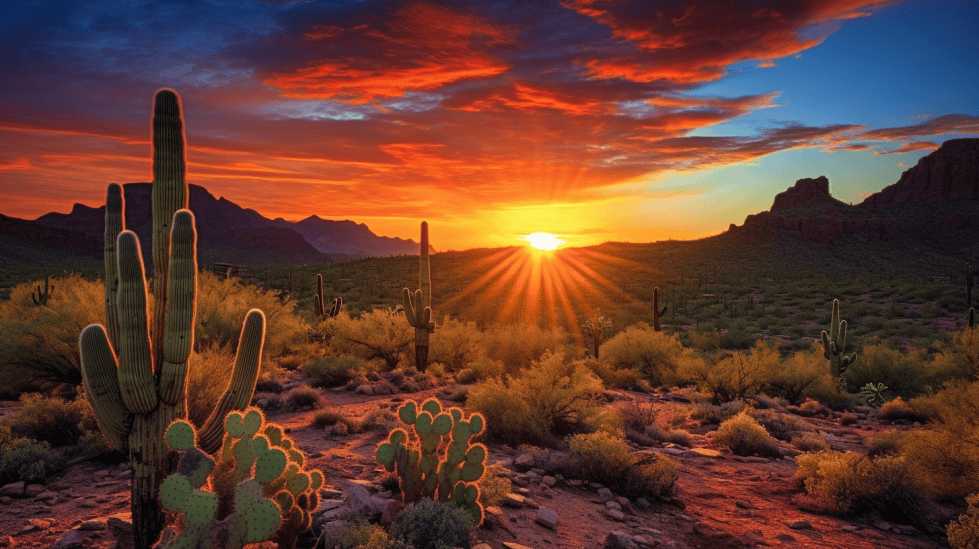Best State to Homestead Off Grid
Homesteading off-grid is becoming an increasingly popular lifestyle choice for many people seeking self-sufficiency and a closer connection to nature. The best state for off-grid homesteading depends on various factors such as land prices, natural resources availability, climate, and state laws. In addition, some states are more homestead-friendly than others, offering a blend of ideal conditions for off-grid living, a lower cost of living, and a welcoming community.
When considering off-grid living, it’s essential to compare land prices, natural disaster risks, and the cost of living in different states. State laws and building codes can also impact your decision, as certain jurisdictions are more lenient than others regarding off-grid construction and energy production. The availability of natural resources, particularly water and arable land, is crucial for self-sufficiency and a successful homesteading experience. Climate plays a significant role as well, as it not only affects the growing season for crops but also determines your heating and cooling requirements.
Key Takeaways
- Choosing the best state for off-grid homesteading involves considering factors such as land prices, climate, and state laws.
- Analyzing natural resources availability, including water and fertile land, is crucial for self-sufficient living.
- It’s essential to investigate the cost of living and taxation, as well as population density and crime rates, to determine the most suitable states for off-grid living.
Considering Off-Grid Living
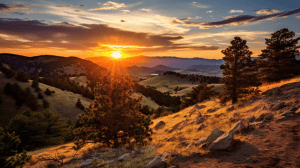
I’ve always been fascinated by the idea of off-grid living and the opportunities it presents for sustainable living. When choosing the best state for homesteading off-grid, several factors come into play. In this section, I will discuss some of the best states for off-grid living in the US and the reasons why they stand out.
Among the top states for homesteading, Colorado is a popular choice due to its diverse landscape and ample opportunities for sustainable living. The climate is generally mild, and access to water and fertile soil makes it an excellent option for growing your own food and raising livestock.
Tennessee and West Virginia are also considered great homesteading states, thanks to the low cost of living, favorable gun laws, and the availability of resources. Both states feature predominantly rural landscapes, allowing for plenty of space to build a self-sufficient homestead.
In the Pacific Northwest, Oregon stands out due to its eco-friendly mindset and abundance of natural resources. The mild climate, fertile soil, and access to water make it an excellent choice for growing your own food and harnessing renewable energy sources like solar or wind power.
If you’re looking for off-grid living opportunities with more remote options, Alaska is worth considering. While the climate may be more challenging, the vast expanse of land and natural resources can provide a unique homesteading experience for those seeking true independence.
Finally, Arizona is a top contender, especially for those interested in desert homesteading. With sunny weather year-round and low population density, it’s an ideal location for harnessing solar power and cultivating a self-sufficient lifestyle.
When it comes to off-grid living, the key is considering your own preferences, needs, and abilities to maximize the potential of your homestead. By choosing a suitable location, you can work towards building a sustainable and fulfilling lifestyle, aligning with your values and priorities.
Best States for Off-Grid Living
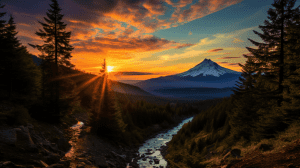
In my research, I’ve discovered that several states stand out as the best options for off-grid living in the United States. Factors such as cost of land, cost of living, property tax rates, and individual liberties contribute to the overall appeal of each state for homesteaders. I will discuss some of the top states that cater to off-grid living, including West Virginia, New Mexico, and North Carolina.
West Virginia offers many benefits for off-grid living, such as affordable land, a low cost of living, and a welcoming community of fellow homesteaders. The mountainous terrain provides ample opportunities for solar and water power, making it a great state for sustainable living. West Virginia’s relatively relaxed building codes and regulations also make it easier for homesteaders to establish their off-grid homes.
New Mexico is another attractive option for off-grid living, thanks to its vast stretches of inexpensive land, abundant sunshine, and mild climate. The state’s low population density ensures a good measure of privacy for off-grid homesteaders. The diverse landscape of New Mexico, ranging from mountains to deserts, provides a variety of options to suit different off-grid lifestyles. Additionally, the state has lenient building regulations and low property taxes, making it an affordable choice for off-grid living.
In North Carolina, off-grid homesteaders can take advantage of the state’s mild climate, fertile soil, and abundant water resources. The state offers a mix of rural and urban environments, giving potential off-grid candidates a range of options to choose from. The cost of land in North Carolina can vary but is generally affordable, making it an appealing choice for off-grid homesteaders looking to establish their properties. North Carolina also has a strong community of like-minded individuals who support sustainable living and off-grid lifestyles.
Some other notable states for off-grid living include New Hampshire, North Dakota, New York, and New Jersey. Each of these states offers unique benefits and challenges for off-grid homesteaders. Factors such as climate, landscape, and individual state regulations contribute to the overall feasibility of off-grid living in these locations. Ultimately, the best state for off-grid living will vary depending on personal preferences, financial resources, and homesteading goals.
Comparing Land Prices
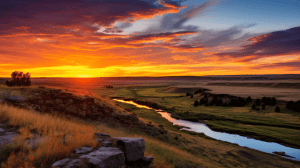
When looking for the perfect off-grid homesteading location, it’s essential to compare land prices. In my research, I’ve found that some states offer more affordable land than others. For instance, land in states like West Virginia and Missouri is known for being relatively inexpensive compared to other states.
When considering the cost of land, it’s not just about finding cheap land; it’s also about evaluating the overall affordability. Affordability takes into account factors like property taxes, cost of living, and access to jobs or business opportunities. States such as Tennessee and Texas are known to have lower property taxes, making them more affordable for homesteading.
Finding free land may seem like a dream, but there are indeed a few places in the United States that still offer free land under specific conditions, such as commitment to a particular industry or agreeing to build a home on the property. Kansas and Nebraska are good examples of states that have free land programs for those who qualify. But keep in mind that free land might come with additional costs, such as infrastructure improvements or access to resources.
In some cases, the high cost of land might be due to the following reasons:
- Scarcity of resources such as water or fertile soil
- Tough zoning laws or regulations that limit off-grid living
- Higher demand for land due to population growth or desirable location
I recommend researching land prices in the states you’re considering for your off-grid homestead, as well as the factors that might affect their affordability. By comparing different states and understanding the local market conditions, you’ll be better equipped to find the perfect piece of land for your off-grid lifestyle.
Analyzing Natural Disasters’ Risk

When considering the best states for off-grid homesteading, it’s important for me to analyze the risk of natural disasters in each location. This is because I want to ensure the safety and stability of my future home. Studying the various risks associated with natural disasters can not only help me prevent potential disasters but also reduce the economic and social losses that could follow such events.
States like Tennessee, Maine, Texas, Montana, Alaska, Arizona, Vermont, Missouri, Oregon, and North Carolina are considered among the best for off-grid homesteading. While evaluating these states, I will also assess their susceptibility to different types of natural disasters.
For example, I need to be aware of the risks associated with tornadoes in states like Texas, Oklahoma, and Kansas. Additionally, the coastal states like North Carolina and a few parts of Texas may be prone to hurricanes, flooding, and storm surges.
On the other hand, I should consider the threat of earthquakes in states like California, Alaska, and Oregon due to their proximity to active fault lines. Similarly, states like Arizona and New Mexico are susceptible to droughts and wildfires.
By understanding the various risks associated with natural disasters in each state, I can make a more informed decision when choosing the ideal location for my off-grid homestead. This knowledge will also help me plan for potential hazards by implementing precautionary measures, such as building with resistant materials or having an emergency plan in place.
In conclusion, considering the risk of natural disasters is a crucial factor when selecting the best state for off-grid homesteading. Familiarizing myself with the specific threats in each region will enable me to be better prepared and ensure a safe and sustainable environment for my future home.
Understanding State Laws and Building Codes
When I’m considering homesteading off-grid, it’s crucial to be aware of the state laws and building codes that may impact my ability to establish and maintain a sustainable lifestyle. Each state has its own set of regulations, so it’s important to research and understand the local policies and procedures before committing to a specific location.
In some states, off-grid living has more lenient regulations, allowing me to live with fewer restrictions and more flexibility. For instance, states like Missouri, Tennessee, and Texas are often cited as having homesteader-friendly laws that encourage self-sufficiency. However, other states might have more rigid building codes that could potentially stifle some off-grid aspirations. Researching building codes ensures that I set up my homestead according to local requirements, avoiding fines or legal issues down the line.
Collaborating with local government and understanding the ins and outs of local laws are essential for the success of my off-grid homestead. For example, obtaining the necessary permits for building structures or accessing water sources is vital, and it is helpful to be aware of any zoning restrictions that might limit the type of off-grid lifestyle I desire. Additionally, certain areas may have specific regulations concerning things like waste management and renewable energy.
To navigate all of these various regulations effectively, I believe networking with other off-grid homesteaders and joining local groups can be a valuable resource. Sharing experiences and advice can save time and help me avoid potential issues when setting up my off-grid homestead, and it provides a sense of community that is often important to those pursuing this lifestyle.
In conclusion, understanding state laws and building codes is a critical component of successful off-grid homesteading. By researching the regulations in my chosen location, working with local government, and connecting with other off-grid enthusiasts, I can establish a sustainable and compliant homestead tailored to my specific needs.
Examining Natural Resources Availability
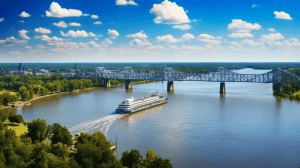
When considering the best states for off-grid homesteading, it’s essential to examine the availability of natural resources. This includes several factors, such as fertile soil, water rights, surface water, and renewable resources.
I have observed that states with fertile land are crucial for successful homesteading, as it allows for healthy crop growth and maintains the overall sustainability of one’s property1. In my experience, states like Kentucky, Tennessee, and West Virginia are known for their fertile soil, making them ideal locations for homesteading.
Water rights and availability are also significant considerations, as they greatly impact a homestead’s ability to thrive. In certain states, such as Colorado and Idaho, securing water rights can be challenging2. However, other states, like Michigan and Maine, have abundant surface water and less restrictive regulations on water usage3. This makes them favorable options for off-grid living.
When examining off-grid states, I also consider the availability of agricultural land. States like Kansas and Oklahoma are renowned for their farming culture, offering ample land for agricultural purposes4. This provides opportunities for off-grid homesteaders to cultivate crops and raise livestock while maintaining self-sufficiency.
Lastly, it’s essential to recognize the role of renewable resources in off-grid homesteading. While many off-grid properties rely on solar and wind energy, it’s important to consider the availability of these resources in different states. For example, states like Arizona and Montana offer abundant sunshine, making solar energy a viable option5.
As I search for the ideal location for off-grid homesteading, I continue to prioritize the availability of natural resources and their impact on successful, sustainable living.
Footnotes
Reviewing Climate Conditions across Different States
When considering homesteading off-grid, it’s crucial to take into account the climate conditions of various states. I’ve discovered that some states offer a more temperate climate, while others present more extreme conditions.
In my search, I found that states such as Tennessee and Georgia are known for their moderate climates, which provide a comfortable living environment for homesteading. These states often experience mild winters and warm summers, making them ideal for growing crops and raising livestock.
On the other hand, states like Alaska and Montana come with harsh winters and relatively short growing seasons due to their colder climates. However, despite the challenges, some off-grid homesteaders still choose to settle in these states because of the abundance of natural resources and the sense of isolation they provide.
I also noticed that states with hot summers, such as Texas and Arizona, can pose challenges to off-grid living due to demands on water resources and the potential for heat-related health issues. However, these states also present unique opportunities for solar energy generation, which can be a considerable advantage for off-grid homesteaders.
When it comes to milder climates, I found that states like Oregon and North Carolina offer a mix of warm summers and mild winters. This balance, coupled with their abundant natural resources, makes these states suitable options for off-grid living.
In conclusion, it’s essential to weigh the climate conditions of different states when planning your off-grid homestead. Whether it’s a temperate, mild, or moderate climate, each state offers its own unique challenges and opportunities.
Exploring Power Options for Off-Grid Living
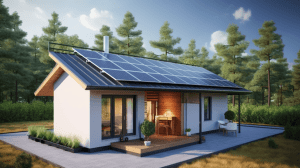
When considering homesteading off the grid, it’s essential to plan how I will generate my electricity. To successfully achieve energy independence, I can choose from several renewable energy options that are both eco-friendly and cost-effective.
One popular choice for off-grid living is solar power. By installing solar panels on my property, I can harness the sun’s energy to generate electricity. Solar panels convert sunlight directly into direct current (DC) electricity, which can be used to power my appliances and charge my off-grid battery storage system. Solar energy is a clean, renewable source of power, and depending on my location, it may offer an abundant and consistent supply of energy throughout the year.
Another viable option is wind power. To generate electricity from wind, I can use wind turbines strategically installed on my property. Wind turbines capture the kinetic energy of the wind, which then turns the blades connected to a generator, producing electricity. Wind power is also a green, renewable source of energy, and it can complement solar power, especially in the regions where sun and wind are abundant at different times of the year.
Micro-hydro power is another possibility when my homestead is near a flowing water source. Using a small turbine installed in a river or stream, I can convert the kinetic energy of water into electricity. This option is both clean and renewable, just like solar and wind power. While this method may be more location-dependent than the other two, it can provide continuous electricity as long as there is a steady flow of water.
To optimize my electricity generation while minimizing the impact on my environment, I can combine these renewable energy sources depending on my location and resources. By researching and selecting the appropriate system to suit my off-grid homesteading needs, I increase my chances of success in achieving a comfortable and sustainable lifestyle.
Investigating the Cost of Living and Taxation
When considering the best states for off-grid homesteading, it’s essential to take into account the cost of living and taxation. I’ve looked into various factors such as low cost of living, low property taxes, state income tax, and homestead exemptions to help determine which states may be the most suitable for this lifestyle.
In terms of low cost of living, states like Wyoming and Missouri have been reported to offer more affordable land prices and general living expenses. This can be a critical factor when starting a homestead, as it allows for more financial flexibility and potentially easier access to resources.
Property taxes are another essential aspect to investigate, as they can significantly impact your financial situation. Wyoming stands out again in this regard, with low property taxes that contribute to the affordability of land and overall cost of living.
State income tax is also worth considering when choosing a location for off-grid homesteading. States like Texas and Tennessee do not have a state income tax, which can help reduce the burden on your finances.
High taxes can be a deterrent when planning for an off-grid lifestyle, as they may cause financial strain and limit your options. It’s important to weigh the overall tax burden in each state to make an informed decision.
Finally, I considered homestead exemptions, which offer property tax relief to homeowners in various states. These exemptions can help reduce the cost of owning and maintaining a homestead, making it more feasible to live off-grid. Some states with notable homestead exemptions include Texas, Oklahoma, and Kansas.
By researching the cost of living and taxation factors thoroughly, I hope to provide valuable information to help you make a well-informed decision on the best state for off-grid homesteading.
Assessing Population Density and Crime Rates
When I’m researching the best states for off-grid homesteading, considering the population density and crime rates is crucial. In my experience, rural areas with low population densities are more suitable for off-grid living, as they provide more land for farming, better access to natural resources, and the opportunity for greater self-reliance.
I’ve noticed that small towns and big cities have their own unique challenges for off-grid homesteading. In small towns, although there may be lower population density compared to larger cities, I’ve found it can be difficult to find suitable land at affordable prices. On the other hand, big cities often come with higher crime rates, which can pose additional risks to those pursuing off-grid lifestyles.
Now, when discussing crime rates, it’s important to remember that low crime rates are preferable for off-grid homesteading. In states like Maine, the crime rate is significantly lower than in other areas, making it a safer option for living off the grid. However, don’t solely base your decision on crime rates, as they can vary within different regions and communities.
In conclusion, to find the best state for off-grid homesteading, I believe it’s essential to assess population density and crime rates, focusing on rural areas and low population densities combined with low crime rates. These factors contribute to a safer and more sustainable off-grid lifestyle.
Understanding Water Provisions
When living off-grid, it’s crucial to secure a reliable and safe water source. I’ve researched the best options and practices to help you understand the importance of water provisions while homesteading off-grid.
Rainwater harvesting is an efficient and environmentally-friendly technique that can provide ample water for your off-grid home. By collecting, storing, and filtering rainwater, I can have a sustainable source of water for my daily needs, such as drinking, cooking, and irrigation. This practice not only reduces my dependence on municipal water systems but also conserves water resources. To set up an effective rainwater collection system, I need to install durable gutters, downspouts, and a storage tank. Additionally, it’s vital to have a filtration and purification system to ensure the harvested water is safe for consumption.
Besides rainwater harvesting, another viable option for water provisions is accessing natural water sources. I can consider tapping into groundwater by drilling a well or using a hand pump. Both methods can supply me with a constant flow of clean water, especially if the water table is high in my homesteading location. However, it’s essential to have the water tested for quality and contaminants before using it for any purpose. If my property is near a river, lake, or stream, I can also obtain water from these sources and use a filtration and purification system to make it safe for consumption.
In conclusion, securing a reliable water source is fundamental for a successful off-grid homestead. By investing in a rainwater harvesting system or tapping into natural water sources, I can achieve self-sufficiency and independence in my water provisions. Careful planning and implementation of these methods will help me adapt and thrive in an off-grid lifestyle.
Evaluating Suitable Land for Agriculture
When it comes to finding the ideal location for off-grid homesteading, the availability of suitable land is crucial for agricultural success. In my search for the perfect spot, I prioritize factors like the long growing season, abundant rainfall, and plenty of sunshine.
A long growing season is essential as it allows me to cultivate crops for extended periods, increasing overall productivity. States like Texas and Georgia offer desirable growing conditions due to their warmer climates and lengthy growing periods.
Another important consideration is rain. With the average rainfall playing a significant role in crop production, I look for areas with sufficient precipitation levels. For example, Tennessee provides ample rain throughout the year, contributing to lush and fertile soil.
Sunshine is another vital element in agriculture, and I focus on areas with abundant sunlight to ensure optimal photosynthesis for crop growth. States like Arizona offer generous amounts of sunlight, making them suitable candidates for solar-based off-grid living as well.
Lastly, the size and quality of the land play a considerable role in establishing a successful off-grid homestead. Seeking out locations with affordable acres of land and good soil quality can make all the difference when it comes to effective agriculture.
In conclusion, by carefully considering factors such as the growing season, rainfall levels, sunlight, and land size and quality, I can make an informed decision on the ideal location for my off-grid homestead.
Appreciating the Natural Beauty of Potential States
As I explore the best states for homesteading off-grid, I can’t ignore the importance of surrounding myself with natural beauty. Living off-grid means immersing ourselves in nature, so choosing a state with breathtaking landscapes and diverse ecosystems can make the experience even more fulfilling.
One of the potential states that stand out for their natural beauty is Colorado. With its magnificent mountains, forests, and rolling plains, Colorado offers a little bit of everything for nature lovers. Plus, the state’s diverse flora and fauna make it a haven for wildlife photographers and birdwatchers alike.
Down south, Tennessee is another excellent choice for those who appreciate lush green landscapes. Known for its picturesque mountains, fertile valleys, and sparkling rivers, Tennessee provides a serene and inspiring setting for homesteaders. Additionally, the Great Smoky Mountains National Park, which spans the border between Tennessee and North Carolina, attracts millions of visitors each year, further testifying to the region’s natural allure.
Hawaii, though lesser-known for homesteading, boasts incredible natural beauty and unique ecosystems that could inspire any off-grid enthusiast. Volcanic mountains, lush rainforests, and pristine beaches are just some of the many enchanting landscapes to be enjoyed on the islands.
Finally, Alaska is an excellent option for true off-grid adventurers. Although its remote and harsher living conditions may not be for everyone, Alaska’s vast wilderness, towering mountain ranges, and abundant wildlife make it a dream come true for nature lovers seeking ultimate solitude.
Each of these states offers a unique and captivating natural environment that will not only enhance the off-grid homesteading experience but also inspire a closer connection with the earth.
Frequently Asked Questions
Off-grid laws: Top states to consider
I would recommend considering states like Colorado, Tennessee, Arizona, and Alaska based on their friendly off-grid laws and availability of resources. Some states have laws that make it easier to harvest rainwater, generate renewable energy, and build without permits, which is essential for off-grid living.
Best locations for complete off-grid living
In my opinion, the best locations for complete off-grid living include remote areas with abundant natural resources such as land, water, and timber. Some prime examples are Montana, Maine, and Oregon, which offer plenty of outdoor space and opportunities for self-sustainability.
Top states for communes and sustainability
States like Vermont, New York, and California are known for their thriving networks of intentional communities, eco-villages, and sustainability-focused groups. In these states, you may find it easier to join or start a sustainable commune that shares resources, skills, and knowledge.
Cheapest states for off-grid lifestyle
The cheapest states for off-grid living often have low land and property taxes, affordable land prices, and a relatively low cost of living. In my experience, West Virginia, Michigan, and Idaho are among the most affordable options.
Easiest states to live off the land
Living off the land is typically easier in states with fertile soil, diverse ecosystems, and a long growing season. From my research, Tennessee, Kansas, and Kentucky are among the best states for living off the land, offering rich agricultural opportunities and abundant natural resources.
Top 10 off-grid living states
Taking into account the factors mentioned above, I would list the top 10 off-grid living states as:
- Colorado
- Tennessee
- Arizona
- Alaska
- Montana
- Maine
- Oregon
- Vermont
- West Virginia
- Kansas


